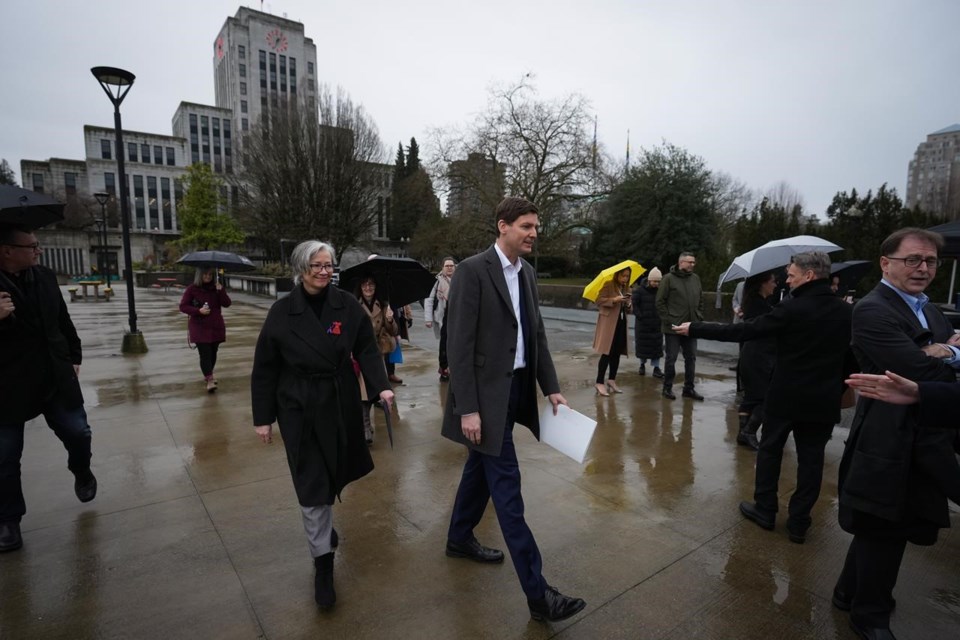VICTORIA — On the same day the British Columbia government's approach to the overdose crisis faces a major shift, the provincial coroner announced another 192 people were killed by illicit drugs in March.
Federal Mental Health and Addictions Minister Ya'ara Saks announced Tuesday that Health Canada had approved B.C.'s request to again prohibit the use of illicit drugs in most public spaces.
Solicitor General Mike Farnworth said at a separate news conference that the changes are a result of hearing the concerns of communities, the public and police in terms of dealing with drug use in public spaces.
"Decriminalization was never about using drugs in public, ever," he said. "Addiction is a health matter, not a criminal justice one, but that doesn't mean anything goes."
He thanked Health Canada for the change, saying public drug use is no longer permitted in public spaces including inside hospitals, on transit and in parks.
"When police are called to a scene where illegal and dangerous drug use is taking place, they will have the ability to compel a person to leave the area, seize the drugs when necessary or arrest the person if required," he said, adding that provincewide guidance and training will be provided to all B.C. officers.
Mental Health and Addictions Minister Jennifer Whiteside said people want safe communities but they also want their friends and family members to be able to call for help without fear.
Opposition BC United addictions critic Elenore Sturko said the province's decriminalization plan failed to help people get the treatment they need and now the government has passed the issue off to the police.
"We need to find a way in B.C. and Canada to look at other models around the world," she said. "Right now we have a system that has utterly failed from the outset. They did not have the services that were needed to provide to even give this a chance of being successful."
B.C. is more than a year into its three-year pilot, giving a Criminal Code exemption for personal possession of up to 2.5 grams of drugs such as heroin, cocaine and methamphetamines.
The province previously tried to make drug use illegal in public places with its own legislation, but the Harm Reduction Nurses Association challenged the bill in court.
Chief Justice Christopher Hinkson ruled in December that if the laws were enacted, “irreparable harm will be caused."
Premier David Eby said instead of waiting for the case to be appealed through the courts, the province would request the now-approved Health Canada exception.
The Harm Reduction Nurses Association said in a statement Tuesday that it was "deeply concerned and frustrated" by Health Canada's decision, saying the move targets those who are "at greatest risk of fatal drug poisoning."
"Today's decision is an improper circumvention of the BC Supreme Court order and will directly jeopardize the health and safety of B.C.'s most marginalized," the association's statement said.
"We know that criminalizing drug use will lead to irreparable harm, and we know that irreparable harm can mean death. We urge the federal government to reconsider this reckless policy regression."
At least 14,400 people have died since the provincial government declared a public-health emergency in April 2016.
The BC Coroners Service said in its statement Tuesday that the overdose death rate makes illicit drugs the leading cause of death for those aged between 10 and 59, surpassing accidents, suicide, homicides and natural causes combined.
It noted the nearly 200 illicit drug deaths in March marked an 11-per-cent decrease from the same month last year.
At least 572 people died in the first three months of this year, and fentanyl has been detected in 85 per cent of the unregulated drug deaths that have undergone toxicology testing.
About three-quarters of those killed in March were male, although the service says the death rate among females is climbing year-over-year, with 23 deaths per 100,000 compared with just over 20 last year.
Whiteside said in a news release reacting to the March statistics that the losses underscore the urgency of continuing to respond to the public-health emergency.
"A crucial part of our work is reducing barriers so that more people can be connected to the care they need, where and when they need it," she said.
- With files from Brieanna Charlebois in Vancouver
This report by The Canadian Press was first published May 7, 2024.
Dirk Meissner, The Canadian Press




